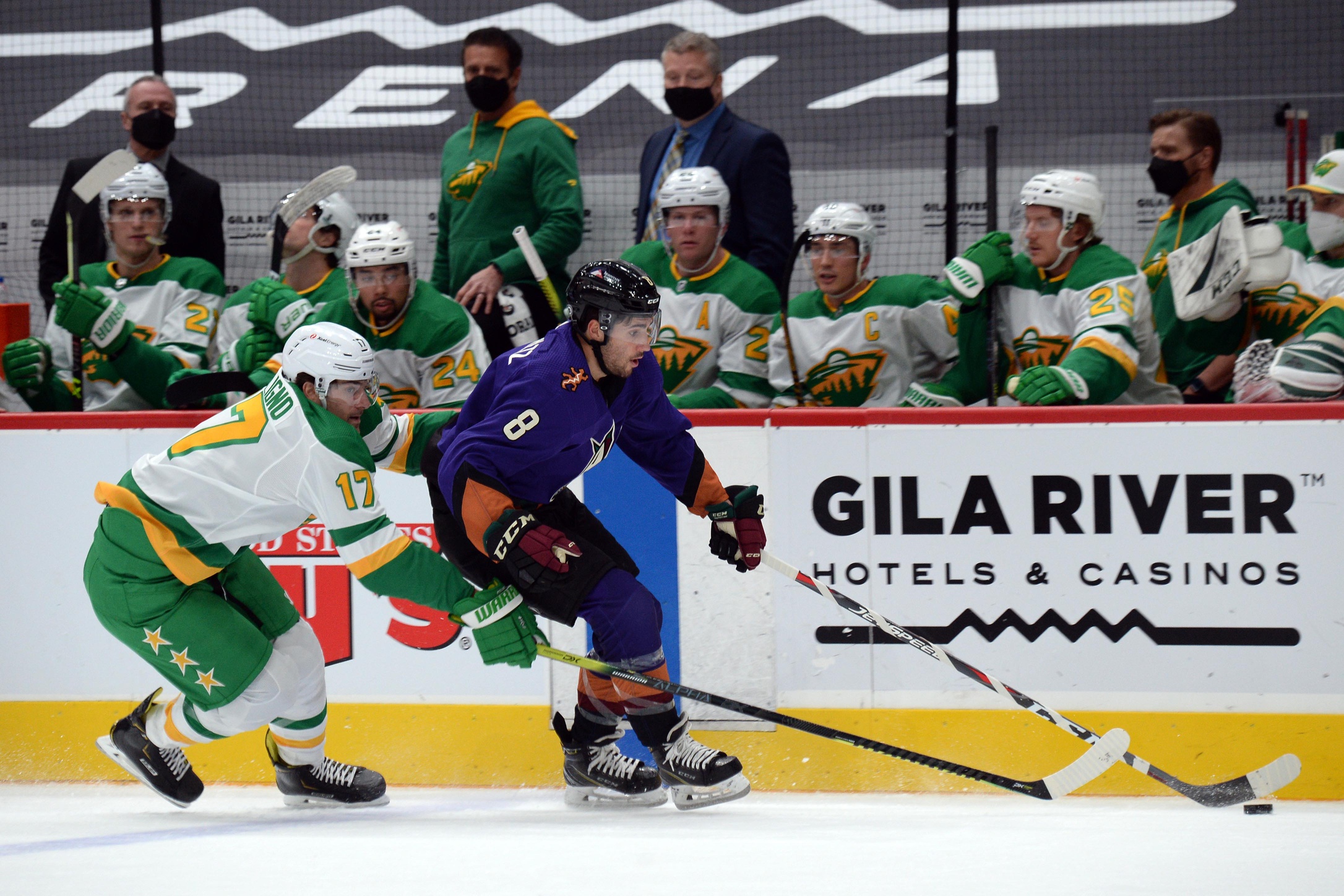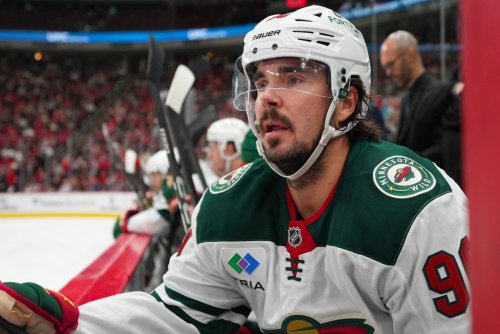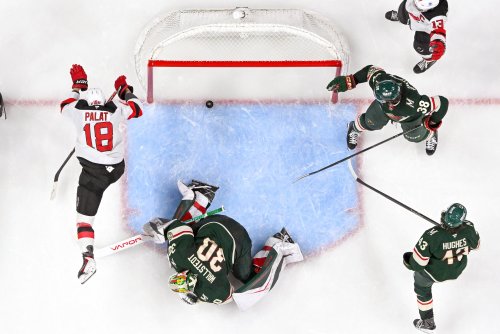
The Minnesota Wild are rarely quiet at the trade deadline. Some moves were well-received, like general manager Bill Guerin flipping Jason Zucker for future assets last season. Some trade deadlines were a chaotic supernova, such as former GM Paul Fenton trading Nino Niederreiter, Charlie Coyle, and Mikael Granlund in a five-week span.
Most of the deadlines of the last decade have involved Minnesota making a “rental trade.” The typical Chuck Fletcher deal was sending away a future asset or two and getting a pending free agent in return.
Rental trade has become a dirty word in the State of Hockey, since arguably none of these moves worked out. Trading two second-round picks for Matt Moulson yielded six playoff wins, with Moulson scoring three points in the postseason. Sending a second for Chris Stewart and a third for Sean Bergenheim a year later netted them two points in 11 playoff games, combined.
The trade that really showed off the downside of renting players was the Martin Hanzal affair. Minnesota had a Cup contender, but looked for help in a thin market. Hanzal — a fine, half-point per game, but not dynamic center — was the most sought-after player available. Fletcher swapped a first, second, and third-round pick to land him. The Wild would get one playoff win for their trouble.
In total, that’s one first, four seconds, and a third-round pick for a combined total of 103 games and 11 playoff wins, with no trips past the second round. That’s a lot of draft capital to surrender for no results.
The Wild have been burned by the rental trade before, but it’s time to get back on that horse. Swinging a deal for a rental this year makes a ton of sense. Why?
A rental trade shouldn’t be particularly expensive. In fact, the price of pending UFAs has dropped significantly since the Hanzal trade in 2017. Teams have discovered the inefficiency of the practice and have adjusted accordingly.
There’s been a sharp rise in the use of conditional picks in such deals. Instead of trading a first-round pick for a player, for example, a team might send a second-rounder that can become a first if they advance to the Conference Final. Or a team might lottery-protect a pick, should they miss the playoffs. These conditions can take a lot of risk out of a rental trade.
There are also going to be way more sellers than buyers. Ten of the league’s 31 teams have playoff odds below 20%. Very few teams can have even a limited amount of fans in the buildings, so revenues are down. There are plenty of teams, even teams that should be in contention, looking to shed or at least not add money. If Minnesota wants to upgrade, there should be options available.
It’s a bit of a hindrance that Minnesota only has $1.3 million of cap flexibility (or, enough to add the pro-rated salary of a $4.7-million player at the time of the deadline, per Michael Russo). Still, they have plenty of expiring money they could use to offset deals, and teams are probably desperate enough to shed salary that they could be pretty motivated to save even $1.3 million.
Guerin can find a lot of value by zagging while everyone else zigs. The Athletic quoted an executive in their Trade Deadline Big Board about Taylor Hall, “Buffalo is going to have to eat half [of his pro-rated $8 million] and I don’t know what they’re getting to do it. Maybe a second? They’re not getting a first.” And this is for Hall, who, despite playing for a terrible team and shooting 3%, still has 16 points in 24 games.
If that trade valuation is accurate, or say if the Buffalo Sabres would accept a second with a condition that could turn it into a first, that’s crazy low! Minnesota’s been fine along the wings this year, but a trade like that represents a huge upgrade over a Zach Parise in the Wild’s top-nine for a playoff run. At that price, why wouldn’t Minnesota try that?
Even if they don’t want to aim that high, or if Hall wants to stay in Buffalo, how expensive could other pending UFAs possibly be? Granlund never worked out in Nashville, but could a return to Minnesota spark him? He’d be able to help the Wild enter the zone on the power play, at the very least, and should come cheap.
Nikita Gusev of the New Jersey Devils might be even cheaper. Gusev’s struggled this year, but the 28-year-old former KHL star put up 44 points last season. Why not try acquiring him and seeing what he can do alongside countryman Kirill Kaprizov in a short stretch?
Ideally, Minnesota would make a trade to fill a long-term need, like at center. Good luck finding the player to do that, especially with Jack Eichel out with injury.
This isn’t a particularly great time to think long-term anyway. The salary cap is going to remain flat, and adding long-term commitments could produce uncertainty for Minnesota going into this summer. Guerin has to give extensions to Kaprizov, Kevin Fiala, and Joel Eriksson Ek this summer. None of them will be cheap, and it’d likely be better to wait to see how those deals shake out before adding long-term solutions.
Seattle’s expansion would also be complicated by such a trade. Minnesota’s already got tough choices to make between protecting Fiala, Eriksson Ek, Matt Dumba, breakout forward Jordan Greenway and Marcus Foligno. Anyone the Wild adds long-term would expose yet another player to the Kraken.
At the same time, standing pat doesn’t feel like the right answer for this squad. They’re not only winning, but putting up numbers that indicate they’re an actually good team. Minnesota controls 56.5% of the expected goals at 5-on-5, a touch ahead of the Colorado Avalanche (56.1%) and miles ahead of anyone else in their division. And for once, they’re not doing it with just defense. The Wild generate 2.57 expected goals per hour at 5-on-5, third in the NHL only behind the Carolina Hurricanes and Toronto Maple Leafs.
This is a team that could maybe go somewhere, but they’re not complete. They can’t really help their center depth, but they can add a dynamic forward to shore up their power-play woes, and probably do so fairly cheaply. If Guerin wants to bring a winning culture to Minnesota, one that can sell players like Kaprizov and Fiala on a long-term future in St. Paul, adding a rental at the trade deadline is a small risk that's well worth taking.
Think you could write a story like this? Hockey Wilderness wants you to develop your voice, find an audience, and we'll pay you to do it. Just fill out this form.







Recommended Comments
Join the conversation
You can post now and register later. If you have an account, sign in now to post with your account.
Note: Your post will require moderator approval before it will be visible.